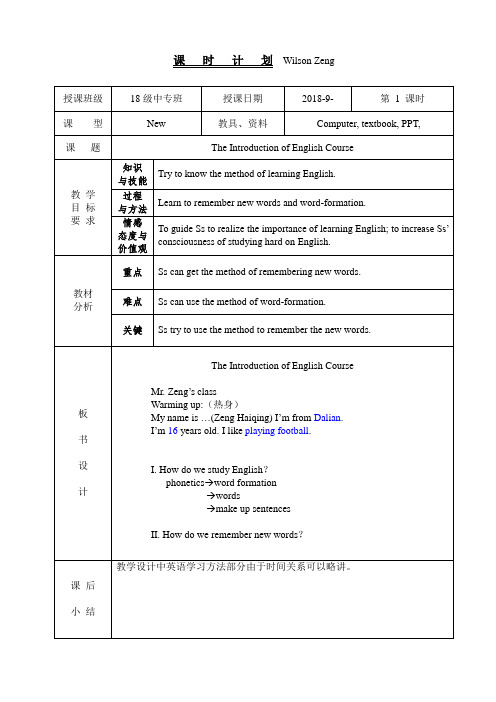unit1英语修订版(基础模块)学生用书第一册第一单元(课堂PPT)
基础英语(第一册)PPTunit 1

New words and expressions
if tired after such long trip laugh tell that get aboard late in
conj.如果, 是否 adj.疲劳的, 累的, 疲倦的 prep.& conj.在…之后, 在…后面 adj.这样的, 这种 adj.长的, 久的 n.旅行, 旅程 vi.笑, 讥笑 n.笑, 笑声 vt.告诉, 告知 adj.& pron.那, 那个 conj.引导从句 vi.& vt.登上, 到达, 变成, 获得 adv.在船(飞机、车)上, 上船(飞机、车) adj.迟的, 晚的 prep.在…之内(上), 在…期间
New words and expressions
望盼
friendly face could feel love country ,望希 hope next develop Chinese China *Smith
v .
adj.友好的, 友谊的 n.脸, 面容, 表情 modal v.可以, 能够 vt.感觉, 觉得 n.爱, 热爱 n.国家, 国土 土国 , 家 v.希望, 盼望, 期待 国 adj.下次的, 其次的 v.发展, 提高 adj.中国的, 中国人的 n.中国 n.史密斯(姓氏)
Unit 1
Warm-up
Greeting 问候
Warm-up
A. Try to remember the following greeting words by heart: □ How are you getting on/along? □ How are you? □ Good morning/afternoon/evening. □ Nice to meet you. □ It’s a great pleasure to meet you. □ It’s my honor to meet you, sir/madam. B. Answer the following questions: How do you greet people who you meet for the first time? Is it polite to ask a stranger some personal affairs? Are there often strangers who want to have a talk with you? Where do you usually meet a stranger? What do you say to your classmates when meeting in the morning?
外研社中职英语基础模块(修订版)第一册Unit1第1课时

计
TheIntroduction ofEnglishCourse
Mr. Zeng’s class
Warming up:(热身)
My name is…(Zeng Haiqing) I’m fromDalian.
I’m16years old. I likeplaying football.
I.How do we study English?
New teaching.
1、How do we study English?
phoneticsword formation
words
make up sentences
Reading
Speaking instruction of studying English
Listening
Writing
2、How do we remember new words?
5、Introduction of the course & textbook.
课程介绍PPT
1) What to learn.
2) How to learn.
3) The requirements of English class.
1)Clear the learning aim.
2)Speak loudly and bravely.
e.g. Please drive carefully.
②合成法
handbag, homework,something, football,
basketball, housework
③转化法
hand n.手v.上交
empty adj.空的v.倒空
water n.水v.浇水
高教中职版《英语1(基础模块)》PPT多媒体课件unit01

B: No, I’m a manager.
Language in use
1 Grammar focus 2 Vocabulary practice
Grammar focus
I am = I’m you are = you’re
he is = he’s she is = she’s
Sara:
I’m from the US.
Activity 10
Listen and repeat. 跟读对话,学说选出的语句。
SLai rXai:aonianG: Looi dXimaornniainng.! I’m Sara Smith.
LSiaXraia:onian: GIosoydomurolransintgn, aMmises XSaiarao!nian?
Activity 9
Li Xiaonian: Li Xiaonian.
Sara:
Is your last name Xiaonian?
Li Xiaonian: No, my last name is Li.
Sara:
I see. Where are you from?
Li Xiaonian: I’m from Tianjin. Where are you from?
My name’s … / I’m … My first name / last name is … I’m from …
First Name
Last Name
From
Everyday English
Reading and writing
1
Activity 13
英语(基础模块)第一册第01-unit1教案

第8课时:练习课。听写、评价作业。巩固提高学生的学习内容,达到复习巩固、评价反馈、拓展延伸的作用,同时帮助学生将所学知识和技能系统梳理,提升学习效果,并增强学生自信心。
二、分课时教学设计
第1-2课时
教学
目标
语言知识目标:1.熟练常见国家名称,如China, UKБайду номын сангаас USA, Australia,
Egypt,France, etc.;以及由此延伸出的常见国籍的表达
或Are you from…或Is it a beautiful place询问该同学;或者用Where is she / he from 或Is he / she from…问其他同学。通过几轮练习,激活学生掌握几句基本句型。
3.请同学们看首页大图,介绍本单元课题。让学生通过标题NicePeople, Nice Places猜测本课学习内容及词汇。
利用图示理论,减少二语学习中母语的干扰。
由机械性操练过渡到半开放性操练,学生有更多思考的机会。
7’
练习
游戏——哪里人:教师请学生每人在卡片上写一个国家名和姓名并收集起来,例如:America, Britain等。由提问的学生抽卡片向全班出示,并用Where are you from提问;被抽到的同学按照提示回答:I’m from America. I’m American.提问同学又问:How do you find it?
unit1英语修订版(基础模块)学生用书第一册第一单元

Warming up
dormitory
宿舍
1. We have skill-training classes in a factory.
我们在一家工厂里上技能训练课。
2. There are six students in my dormitory.
我的宿舍里有六位同学。
Warming up
2 Look and tick. 看图,选出你学过的课程。
有的学汽车修理。 索菲: 你最喜欢什么技能训练课? 李伟:我喜欢会计。这门课很有用。
Listening and Speaking
5 Listen again and fill. 再听录音,填写下表。
All take Some take Li Wei likes
Subjects
maths, English, computer basics cookery, accounting, car-repair accounting
Listening and Speaking
2 Listen and practice. 听录音,谈论校园生活。
Li Wei: You know, my school is quite different. Sophie: Really? In what way? Li Wei: We have our skill-training classes in a factory. Sophie: What do you usually do there? Li Wei: We learn how to use the machines. Sophie: That’s interesting.
Listening and Speaking
高教版中职英语(基础模块 第1册)Unit 1《Nice to meet you!》ppt课件1

•
与此相反,如果坐在前面,首先心情就很不同,自己比别人靠前的感觉让你听课时的态度变得更积极。与老师眼神交会的机会增多,感觉就好像是老师在做一对一个人辅导。
•
有的学生恰恰就是因为这一点,讨厌坐在前面。和老师眼神交会非常有负担,稍微做点儿小动作就会被老师发现,非常不方便。而且坐在前面说不定还会被问到一些难以回答的问题。
是老师在上课时补充讲解的,如果不听讲很可能就会错过这些重点。
•
所以,上课的时间一定要专注于课堂,决不能打开别的习题集去学习,这样才是高效率的学习,才是提高成绩最快的方法。因此,困难也要先听课,那对你将来的自学一定会很有帮助,哪怕你只是记住了一些经常出现的术语,上课的内容好像马上就忘光
了,但等到你日后自己学习的时候,也能让你回想起很多内容。
2019/10/18
教学资料精选
7
谢谢欣赏!
2019/10/18
教学资料精选
8
Homework
Copy these new words one line. Copy these new expressions one time. Read the dialogue with your partner.
曾海卿
大连交通技师学院
编者语
• 要如何做到上课认真听讲?
•
我们都知道一个人的注意力集中时间是有限的,一节课45分钟如何保持时时刻刻都能认真听讲不走神呢?
Unit 1 Nice to meet you
大连交通技师学院 曾海卿
New words for Dialogue
1、introduce v. 介绍 Let me introduce a new friend to you. 2、This is David. This is Li Xiao.
unit1英语修订版(基础模块)学生用书第一册第一单元知识讲稿

In what way? 是In what way is it different? 的 省略形式。在口语中,常会用到一些省略形式。
usually:通常,表示频率。类似的副词还有 always(总是),often(经常),never(从来不)。
李伟:你知道吗,我的学校与众不同。 索菲: 真的吗?在哪方面呢? 李伟:我们在工厂里上技能训练课。 索菲: 你们通常都在那里做什么呢? 李伟:我们学习如何使用机器。 索菲: 那很有趣。
Reading and Writing
1 Read and learn. 读邮件,了解李伟的学校生活。
accounting, and others learn car-repair. Sophie: What skill-training classes do you like best? Li Wei: I like accounting. It’s very useful.
参考译文
索菲: 李伟,你这学期都上什么课? 李伟:我们全都上数学,英语和计算机基础课。 索菲: 你们都上相同的技能训练课吗? 李伟:不是。我们中有的人学烹饪,有的学会计,还
Key sentences:
Warming up
classroom
教室
Warming up
computer lab
计算机房
Warming up
factory
工厂
Warming up
library
图书馆
Warming up
dormitory
宿舍
1. We have skill-training classes in a factory.
有的学汽车修理。 索菲: 你最喜欢什技能训练课? 李伟:我喜欢会计。这门课很有用。
英语基础模块1 学生用书教学课件升级版Unit1

Scripts: Jane : I used to feel stressed out time Jack: to run for exercise every morning. It works.
1 UUNNIITT
Listening and speaking Reading Grammar Writing Culture express
Pronunciation and listening skills News report Conversation Passage
The pronunciations of the fricatives in each pair are difficult to distinguish. Listen carefully and check (✔)the words you hear.
2 Listen to the conversation again and match each of the opinions and facts
to the speaker.
A I think the job is tiring.
B I have to increase sales.
C I managed to find time for exercise.
The pronunciations of the fricatives in each pair are difficult to distinguish. Listen carefully and check (✔)the words you hear.
中职英语高教版(2021)基础模块1第1单元《Understanding》课件

Warming up
早在五千多年以前,中国就已经 形成姓氏,并逐渐发展扩大,世 世代代延续。在中华姓氏文化中, 《百家姓》是我国流行最长,流 传最广的一种蒙学教材。
Culture Understanding
Names
People in English speaking countries tend to put given name before family name. But the majority (大部分) of Chinese people put family name before given name. Family names are so important to us because they tell who our ancestors (祖先) are and where we are from. However, the ways of addressing (称呼) people are the same in English and in Chinese. We can address people by their full names. For example, Yuan Longping and Winston Churchill. In formal (正式的) situations, we usually use Mr, Mrs or Ms before a family name. For example, Mr Yuan and Mr Churchill. And between close friends, we can use given names. For example, Longping and Winston.
Culture understanding生词
英语基础模块1 学生用书教学课件WU

You’ll be able to:
• use some basic English expressions; • understand daily English.
Look at the picture and discuss: 1. Where are the students? 2. What are they doing?
01
02
03
04
05
06
07
08
09
01
1. Listen and practise.听录音,练习互相打招呼。
Hello, I’m Zhou Bo. What’s your name?
Hello, I’m Wu Lin. Nice to meet you.
Nice to meet you, too.
05
2. Look and read.看图,读出下列各组数字。
06
1. Listen and repeat.听录音,跟读,复习月份和星期的说法。
TIP
Tip
英语日期的拼写格式 有美式和英式两种, 美式日期格式是“月日-年”,如July 22(nd), 2019;英式日 期格式是“日- 月年”, 如22(nd) July 2019。
中文翻译
08
Look and practise.看图,练习颜色的说法。
A: What colour is the T-shirt 1? B: It’s red.
09
For teachers
1. It’s time to begin our lesson. 2. Come in, please. 3. Sit down, please. 4. Open/Close your books, please. 5. Listen carefully. 6. Look at the blackboard. 7. Read the text, please. 8. Work in pairs/groups, please. 9. Any questions? 10. That’s all for today.
基础模块英语第一单元第1课时

Unit 1 Nice to meet you!(第一课时)一、教学内容本课时系教材《英语1》(基础模块)第一单元的第一课时,包括Lead-in & Listening and speaking两部分,具体内容为:招呼用语,听懂并掌握询问和提供个人信息的词汇、句型。
二、教学重点、难点⑴教学重点1.招呼用语(Good morning/Hi/Nice to meet you)2.听懂并掌握询问和提供个人信息的词汇、句型⑵教学难点1.个人信息的词汇(name/job/age/address/telephone number)2.重点句型(What’s you name/Where are you from)三、教学目标1.知识目标⑴掌握与个人信息相关的词汇,如name, first name; last name; name card; telephone number; age; address; e-mail address; job (engineer; manager; secretary; teacher; student; doctor; nurse; singer; fans); position(boss);⑵掌握提供或询问个人信息时所使用的句型,如:1) about greeting:Good morning.Hi.Nice to meet you.2) about personal informationWhat’s you name?Where are you from?Which company are you from?2.能力目标⑴学生能听懂关于询问和提供个人信息的对话。
⑵学生能编写关于询问和提供个人信息的对话。
(3) 在日常生活中灵活应用招呼用语以及询问、提供个人信息时所用到的关键句型. 3.情感目标在真实情景交流中,师生间、生生间建立融洽的关系,主动参与、相互赏识。
英语基础模块1 学生用书教学课件升级版英语基础模块1-TU1

01 02 03 04
01
There must be many different activities at your new school. What are they? Are you enjoying your “busy” life? Make a weekly plan for yourself.
03
• Each group should select one person to make a report about the survey results to the class.
• Find the classmates who like the same sports and form different sports groups.
can get there from your school. Let your classmates guess what place it is.
02 Make a self-introduction card, including your name, character, hobbies and what kind of friends you would like to make etc.
My name My character My hobbies I’d like to make friends with people who are
04
Draw a map of your school’s surrounding area.
School You are here
04
• Show your map to the class and make a presentation. • Choose a place on your map and describe how you
外研社中职英语基础模块修订版 UNIT1 ppt课件

S2: Are you from France, Sophie? Sophie: Yes, I came here to join the exchange programme.
S2: Oh, welcome to our school! I hope you’ll enjoy your stay here.
teacher mother friends brother
Good morning, Tim! Nothing too bad! It’s OK! Morning, honey!
Listening and Speaking
1 Listen and learn. 听录音,学习下列词语。
opportunity n. 机会 exchange n. & v. 交换 assistant n. 助理,助手
Sophie: Thank you! I’m very happy to have this opportunity. I want to make more friends here.
Listening and Speaking
4 Listen and practice. 听录音,练习介绍新同事。
参考译文
刘华:你好,李晓。让我给你介绍一位新朋友吧。这是戴 维。戴维,这是李晓。
李晓:很高兴认识你。 戴维:我也很高兴认识你。 李晓:戴维,你是来自英国吗? 戴维:是的。我到这里来上暑期班。 李晓:哦,欢迎到我们学校来。希望你在这里过得愉快。 戴维:谢谢!我很高兴能有这个机会。希望能在这里结交
更多的朋友。
Mr Brown: Hello, Ms Xie. It’s a great pleasure to meet you.
英语基础模块unit1PPT课件

5
精选ppt课件2021
Group 3 /p/ and /b/
Script (1) There is a bear in the zoo. (2) My cap is black.
6
精选ppt课件2021
Group 4 /p/ and /f/
Script (1) I bought a pan yesterday. (2) The restaurant is full of people now.
叫做major?me?d??r主修computerk?m?pju?t?r计算机电脑science?sa??nscontinuednewwords精选ppt课件202113art美术number?n?mb?r数字minema?npron
英语
基础模块
精选ppt课件2021
上册
1
Unit 1 Greetings
4. Nice to meet you, Jane. nice to meet you意为“很高兴见到你”,常用于初次见面。其回答 为Nice to meet you, too. 初次见面的问候语还有How do you do? /How are you?其回答为How do you do?/Fine, thank you.例如: —Nice to meet you, Miss Gao. 高小姐很高兴见到你。 — Nice to meet you, too. 很高兴见到你。
Section B Listening and Speaking
Warm-up
Dialogue Study
Activities
9
精选ppt课件2021
Warm-up
Look at the picture and tick. Emily and Jenny meet each other for the first time. Tick what they would say.
- 1、下载文档前请自行甄别文档内容的完整性,平台不提供额外的编辑、内容补充、找答案等附加服务。
- 2、"仅部分预览"的文档,不可在线预览部分如存在完整性等问题,可反馈申请退款(可完整预览的文档不适用该条件!)。
- 3、如文档侵犯您的权益,请联系客服反馈,我们会尽快为您处理(人工客服工作时间:9:00-18:30)。
Warming up
1 Listen and match. 听录音,将下列词语与图片匹配。
Key sentences:
Warming up
classroom
教室
Warming up
computer lab
计算机房
Warming up
factory
工厂
Warming up
library
图书馆
Listening and Speaking
3 Listen again and act. 再听录音,根据提示表演对话。
store/sell goods
S1: You know, my school is quite different. S2: Really? In what way? S1: We have our skill-training classes in a store. S2: What do you usually do there? S1: We learn how to sell goods. S2: That’s interesting.
Sophie: What subjects are you taking this term, Li Wei? Li Wei: We all take maths, English and computer basics. Sophie: Do all of you take the same skill-training classes? Li Wei: No. Some of us learn cookery, some learn
Listening and Speaking
2 Listen and practice. 听录音,谈论校园生活。
Li Wei: You know, my school is quite different. Sophie: Really? In what way? Li Wei: We have our skill-training classes in a factory. Sophie: What do you usually do there? Li Wei: We learn how to use the machines. Sophie: That’s interesting.
restaurant. S2: What do you usually do there? S1: We learn how to prepare food. S2: That’s interesting.
ቤተ መጻሕፍቲ ባይዱ
Listening and Speaking
4 Listen and practice. 听录音,谈论学校课程。
√ English √ maths
√ cooking
√ car-repair
√ √ computer basics chemistry
Listening and Speaking
1 Listen and learn. 听录音,学习下列词语。
skill n. 技能 train v. 培训 machine n. 机器 subject n. 学科,科目 cookery n. 烹饪 accounting n. 会计
Unit 1
School becomes interesting.
1
Look at the picture and discuss:
1. Where are they? 2. What are they doing?
You’ll be able to:
1. describe school subjects; 2. talk about after-school activities.
有的学汽车修理。 索菲: 你最喜欢什么技能训练课? 李伟:我喜欢会计。这门课很有用。
Listening and Speaking
5 Listen again and fill. 再听录音,填写下表。
All take Some take Li Wei likes
Subjects
maths, English, computer basics cookery, accounting, car-repair accounting
Listening and Speaking
3 Listen again and act. 再听录音,根据提示表演对话。
restaurant/prepare food
S1: You know, my school is quite different. S2: Really? In what way? S1: We have our skill-training classes in a
Warming up
dormitory
宿舍
1. We have skill-training classes in a factory.
我们在一家工厂里上技能训练课。
2. There are six students in my dormitory.
我的宿舍里有六位同学。
Warming up
2 Look and tick. 看图,选出你学过的课程。
accounting, and others learn car-repair. Sophie: What skill-training classes do you like best? Li Wei: I like accounting. It’s very useful.
参考译文
索菲: 李伟,你这学期都上什么课? 李伟:我们全都上数学,英语和计算机基础课。 索菲: 你们都上相同的技能训练课吗? 李伟:不是。我们中有的人学烹饪,有的学会计,还
参考译文
In what way? 是In what way is it different? 的 省略形式。在口语中,常会用到一些省略形式。
usually:通常,表示频率。类似的副词还有 always(总是),often(经常),never(从来不)。
李伟:你知道吗,我的学校与众不同。 索菲: 真的吗?在哪方面呢? 李伟:我们在工厂里上技能训练课。 索菲: 你们通常都在那里做什么呢? 李伟:我们学习如何使用机器。 索菲: 那很有趣。
